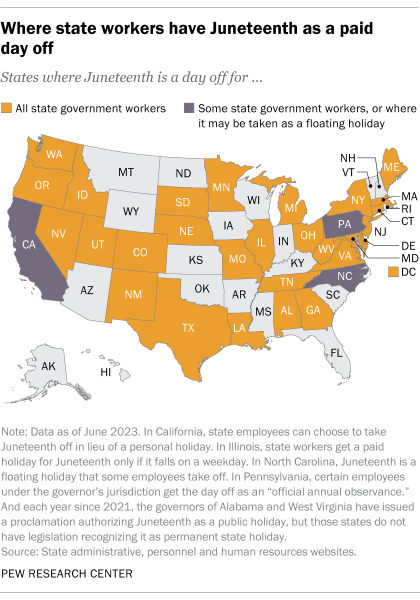The newest federal holiday, Juneteenth National Independence Day, celebrates the end of slavery in the United States. But at the state level, governments vary considerably in whether they commemorate it as an official holiday, a day of observance or something in between.
This year, at least 28 states and the District of Columbia will legally recognize Juneteenth as a public holiday – meaning state government offices are closed and state workers have a paid day off – according to a Pew Research Center analysis of state human resources websites, state legislation and news articles. Connecticut, Minnesota, Nevada and Tennessee have made Juneteenth a public holiday at the state level starting this year.
Juneteenth is the newest federal holiday in the United States, and one that is celebrated differently across the states. Pew Research Center took a look at how each state commemorates the day.
We focused on states that observe Juneteenth as an official public holiday – meaning state offices are closed and state workers get a paid day off. Our main sources for this analysis were state administrative, personnel and human resources websites, most of which post lists of official state holidays. We supplemented those lists with an analysis of news reports about local observances of Juneteenth and, where relevant, state legislation.
New Mexico’s Legislature added Juneteenth as an official state holiday in 2006, observed on the third Saturday of June; it became a paid holiday for state workers for the first time in 2022. In Illinois, state workers get a paid holiday for Juneteenth only if it falls on a weekday. Governors in Alabama and West Virginia authorized Juneteenth as a holiday for state workers this year, last year and in 2021. Legislatures in each state must pass a law for it to become a permanent official state holiday. The governors’ proclamations must be issued annually in the absence of permanent legislation.

In most of these states, Juneteenth is designated as a permanent state holiday and commemorated annually. In Alabama and West Virginia, Juneteenth has been authorized as a state holiday for this year by a governor’s proclamation; the holiday can become permanent in these states if their legislatures pass bills to make it so.
In addition to D.C. and the states where Juneteenth is an official public holiday, other states give certain government workers the day off but haven’t declared Juneteenth a holiday at the state level.
Starting this year, California state employees can choose to take Juneteenth off in lieu of a personal holiday. In Pennsylvania, the day is designated as an “official annual observance” and a paid day off for state employees under the governor’s jurisdiction. And in North Carolina, some state workers can choose to take a floating holiday on a day of “cultural, religious or personal significance,” including Juneteenth.

Juneteenth is a combination of the words June and nineteenth. It commemorates the day more than two months after the end of the Civil War – and more than two years after Abraham Lincoln issued the Emancipation Proclamation – when enslaved Black Americans in Galveston, Texas, were informed of their freedom.
It is one of 11 official federal holidays – or 12 for federal workers in the District of Columbia and surrounding areas during presidential inauguration years – meaning that federal workers get a paid day off and there’s no mail delivery. Most federal offices are closed on federal holidays, along with most banks and the bond markets that trade in U.S. government debt. The stock markets generally remain open, as do most retailers and other businesses, though these vary by federal holiday.
Most states where Juneteenth is a public holiday added it to their calendars in 2020 or later. The exception is Texas, where the holiday originated and where it is also known as Emancipation Day. Juneteenth has been celebrated locally in Texas since the 1860s and became an official state holiday there in 1980.
Public awareness of Juneteenth grew in 2020 amid nationwide protests after the police killings of several Black Americans, including George Floyd and Breonna Taylor. President Joe Biden signed the legislation that made Juneteenth a federal holiday in June 2021.
Every state has at some point passed a resolution recognizing Juneteenth at least as a day of observance – even those that do not count Juneteenth among their official public holidays. An observance is a day of awareness that isn’t accompanied by a day off.
In fact, except for Texas, all states that currently recognize Juneteenth as a public holiday commemorated it as a day of observance years before it became an official state holiday. Florida, Oklahoma and Minnesota were the first states outside Texas to commemorate Juneteenth as a day of observance in the 1990s. New Mexico has recognized Juneteenth as a state holiday since 2006, observed on the third Saturday of June; it became a paid holiday for state workers for the first time in 2022.
South Dakota, North Dakota and Hawaii were the last states to give Juneteenth any formal recognition as an important date. The day was not observed in South Dakota until 2020, when the governor proclaimed it a state holiday. In Hawaii and North Dakota, Juneteenth has been a day of observance since 2022 but is not considered a state holiday.
Juneteenth is catching on as a holiday in major U.S. cities as well. Last year, cities including New York, Los Angeles and Phoenix declared the day an official paid holiday for city workers. In addition to Juneteenth, the District of Columbia celebrates Emancipation Day on April 16 in honor of the day Lincoln freed the enslaved people living in D.C., almost nine months before the Emancipation Proclamation.
Note: This is an update of a post originally published June 17, 2022.
